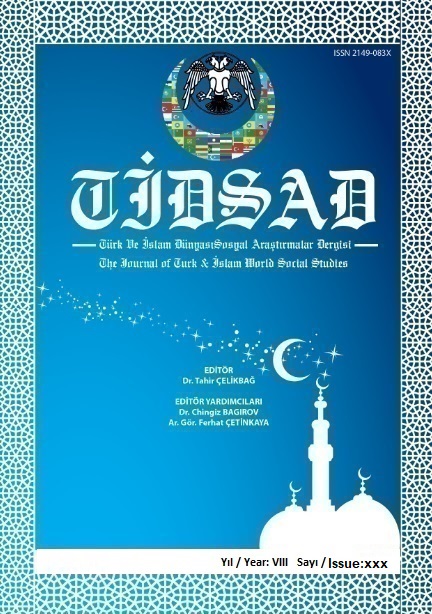Author :
Abstract
Müzeler; toplum için sürekli, kalıcı, kâr amacı gütmeyen önemli bir kültürel değer ifade etmektedir. Müzeler; toplama, belgeleme(arşivleme), koruma(bakım-onarım) sergileme ve eğitimden oluşan işlevleri yapmaktadır. Modern dünyada, müzecilik anlayışı farklı noktalara taşınan bir değişim göstererek, sergileme anlayışından kurtulmuş tarihi yaşatma anlayışına yönelmiştir. Müzeler, birçok ülkede yüzyılı aşkın bir süredir eğitim amacıyla yaygın eğitim kurumları olarak tanımlanmaktadır. Yaşayan müzeler; halk bilimi müzeleri olarak öncü çalışmaların gerçekleştirildiği ve uygulamaların yapıldığı merkezlerdir. Geçmiş ile gelecek arasında kültürel bir köprü oluşturan eşya veya ürünler bireylerin tarihi dokulara ait bilinçlerinin gelişimini sağlamaktadır. En basit anlatımla aile müzesi veya bireysel müzecilik evlerin bodrumlarında veya sandık içlerinde saklanan aileye ait ata yadigârı eski eşyaların sergilenmesidir ve halk bilimi müzeciliğinin de temelini oluşturmaktadır. Aileye ait eski ürünler ailenin geçmişi hakkında bilgi verdiğinden ve aile kültür değerlerini koruduğundan bir mini yaşayan müze olarak ta tanımlanabilir. Çalışmada; bireylerin kendi ailesinin geçmişine ait değerlerin bir araya gelmesi ile oluşan mini müzeciliğin tarihi ve kültürel değerler olarak taşıdığı özellikler anlatılmıştır. Türkiye’deki birey merkezli kültürel girişimlerin dönüşümüne katkısı, aile geçmişine ait ürünlerden mini müze oluşturma, sergileme, yorumlama ve koleksiyonun bilgisini aktarma anlamında aile müzeciliğine katkısı için yapılması gereken çalışmalar açıklanmış ve önerilerde bulunulmuştur.
Keywords
Abstract
Museums; continuously for society, permanent, non-profit and it represents an important cultural value. Museums; collection, documentation (archiving), preservation (maintenance) display and make the functions consisting of education. Museology, showing a change in the modern world moved to different locations, display is directed to understanding the mentality survived the history alive. Today many countries of the world is more than a century for educational purposes is defined as non-formal education institutions and developed countries are museum education classes in schools. Living museums, the folklore museums that are performing pioneering work and a center for the application. Forming a bridge between the past and the future cultural goods or products are to ensure the development of awareness of the historical texture of individuals. The simplest terms my family or ancestors of the family museum stored in the basement of the house or crate individual museum relic is on display inside the old items and form the basis of the folklore museums. It maintains that gives information about the history of old product family and cultural values of the family identified to as a mini living museum. In our study; individual mini-museums of history, caused by a combination of the values of their family history and describes features that move as cultural values. Contribute to the transformation of individuals based cultural initiatives in Turkey, family history of product from creating a mini-museum, exhibiting it, interpret and collection of information transfer in terms of what to do to contribute to the family museology studies have been made is explained and suggestions.
Keywords
- Abacı, O., Müze ve Çocuk, Morpa Kültür Yayınları, 2005, İstanbul.
- Altünbaş, A., Özdemir, Ç., Çağdaş Müzecilik Anlayışı ve Ülkemizde Müzeler., Ankara, 2012.
- Demir, Z. S,. Halk Bilimi Müzeciliğinde Deneysel Yaklaşımlar: Yaşayan Müze., Turkish Studies - International Periodical For The Languages, Literature and History of Turkish or Turkic Volume 8/9 Summer 2013, Ankara.
- İstanbul İl Millî Eğitim Müdürlüğü., Müze Eğitimi., 2011.
- Mimarlar Odası Ankara Şubesi., Ev Müzeler/Tarihî Evler 1. Sempozyumu, Ankara., 2010.
- Okan, B., Günümüzde Müzecilik Anlayışı., Sanat & Tasarım Dergisi, 2015.
- T.C. Kültür ve Turizm Bakanlığı, Kültür Varlıkları ve Müzeler Genel Müdürlüğü., https://kvmgm.ktb.gov.tr 2020.
- T.C. Milli Eğitim Bakanlığı Orta Öğretim Genel Müdürlüğü., Müze Eğitimi, Ankara, 2009.
- Yıldız, M., Müze Eğitimi., İstanbul İl Millî Eğitim Müdürlüğü., 2011.





